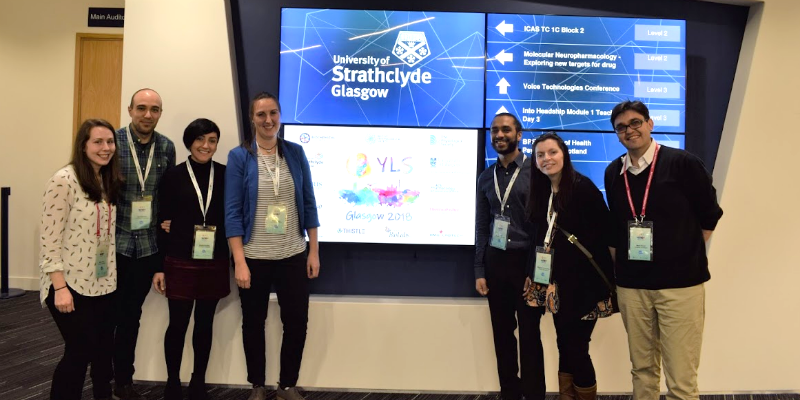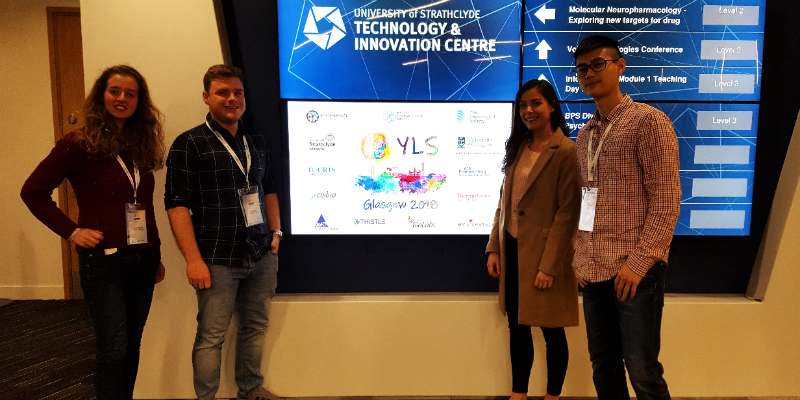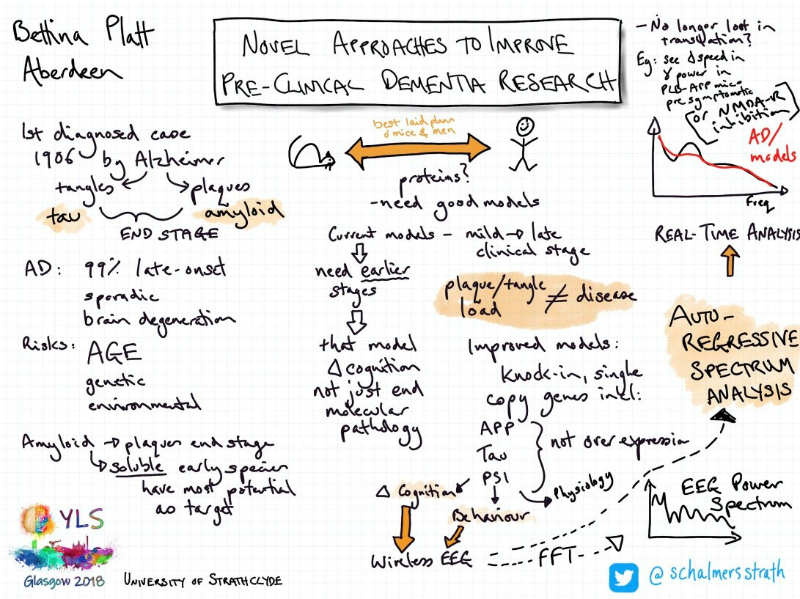Each year the British Pharmacological Society, the Physiological Society and the Biochemical Society come together to support early career researchers in organising a Young Life Scientists’ (YLS) Symposium. Last year our proposal was selected from four applications, which enabled us to assemble a scientific programme comprised of cutting-edge researchers working in the vast fields of neuropharmacology and neurodegenerative disorders.
On 15 November 2018, we welcomed over 100 delegates to the Technology and Innovation Centre at the University of Strathclyde. Attendees ranged from company sponsors, undergraduates, postgraduates and postdoctoral researchers right through to Professors from institutes across the UK and even as far as France, Italy, Poland and India. The representation of different career stages (and nationalities) was also reflected in the organisation committee. The team was comprised of three PhD students (Ms Sarah Hesse, Ms Miriam Scarpa and Mr Mohammed Safar), three postdoctoral researchers (Drs Mark Barbour, Rachel Wood and Mario Rossi) and two independent research fellows (Drs Margaret Cunningham and Sophie Bradley) from across the University of Strathclyde and University of Glasgow. We wanted the event to be all inclusive so we formed a sub-committee comprised of undergraduates and MSci students (Miss Laurine Brouck, Mr Yu heng Su, Mr Liam Butler and Miss Caitlin Cogan) to support the event on the day.


Whilst each Society provided financial support to organise the symposium, we were also successful in securing funds from both the Centre for Translational Pharmacology (University of Glasgow) and Strathclyde Institute of Pharmacy and Biomedical Sciences (SIPBS) based at University of Strathclyde. The Public Engagement Team of the College of Medical, Veterinary & Life Sciences (MVLS) at the University of Glasgow awarded us with the MVLS Engagement with Research Fund, which aims to encourage all staff and students to share the university’s world changing research with the public. Additional sponsorship for the event was also provided by BMG Labtech, Cisbio, Miltenyi Biotec, New England Biolabs, Thistle Scientific, ThermoFisher Scientific, Tocris and the American Chemical Society’s journal Pharmacology & Translational Science. Through the different routes of fundraising, we managed to raise a total of almost £10,000 in sponsorship to support our YLS symposium. This funding ensured that we could offer the delegates a full programme of activities including four keynote speakers, the choice of three career workshops, a drinks networking reception with comedy performances from Bright Club members, followed by an evening meal and ceilidh at Sloans Grand Ballroom.
The symposium opened with a welcome address from Clare Stanford, Professor of Translational Neuropharmacology at University College London and co-chair of the British Pharmacological Society’s Neuropharmacology Affinity Group. Clare encouraged early career members of the audience to get involved in Society activities and provided the audience with a great introduction to the breadth of neuroscientific research and future perspectives. The meeting was comprised of two main session themes: exploring novel therapeutic targets in neurodegeneration and clinical investigations into new targets. Each session was chaired by early career researchers selected from the submitted abstracts. The first session was chaired by Mr Samuel Davies, a PhD student from University of Dundee, who introduced two of our keynote speakers – Professor Bettina Platt (University of Aberdeen), who provided insight into novel approaches to improve preclinical dementia research, and Dr Robert Lane (University of Nottingham), who showcased his impressive research into allosteric targeting of dopaminergic receptors for the treatment of neuropsychiatric disorders. The afternoon session theme was chaired by Mr Sam Groom, a PhD student from University of Bath, who welcomed Dr Lisa Broad (Senior Director for the UK Discovery Pain Group at Eli Lilly) as she presented the story of the development of calcitonin gene-related peptide (CGRP) inhibitors as a treatment for migraine. Unfortunately, one of our scheduled speakers was unable to present on the day, however Professor Andrew Tobin (University of Glasgow) stepped in at last minute to deliver a spectacular talk highlighting the vast approaches his laboratory employ in the development of new therapies aimed to treat dementia. The work presented by the speakers inspired one of the delegates, Dr Susan Chalmers from the University of Strathclyde, to put her artistic skills to good use to create visual abstracts for each talk which were tweeted during the sessions.

In addition to the four key note speakers, five early career researchers were selected for oral communications, with 23 posters on display at the lunch time poster session. The prize for the best oral communication was awarded to Miss Ashleigh Willis (PhD student, University of Glasgow) who delivered an engaging short presentation into the mechanisms of perineuronal net maturation in primary cortical interneurons. A panel of judges was formed from the non-presenting delegates who assessed each poster and awarded best poster presentation prize to Jack Webster (PhD student, University of Strathclyde). The quality of the posters on display made it very difficult for the assessors therefore a runner-up poster presentation prize was awarded to Tanith Harte (Year 4 undergraduate student, University of Strathclyde).

Each delegate had the opportunity to sign up for a workshop upon registration. Ms Zara Gladman from the Glasgow Science Festival provided an excellent introduction to public engagement whilst Mr Jamie Gallagher, an award-winning science communicator, supported a workshop on ‘Sharable Science’. It was clear that the attendees were interested in getting advice and tips for writing their own proposals when the grant writing workshop held by Professor Andrew Tobin became oversubscribed very quickly.
After months of preparation in organising the YLS symposium, it was great to see delegates network and relax at the end of the meeting during the drinks reception. With a glass of wine, delegates were given a taster of science-themed stand-up comedy. The seasoned Bright Club comedians Mr Brynley Pearlstone, Mr Grant Ross, Mr Trevor Martin Sloughter and Ms Wilhelmiina Toivo covered a variety of topics ranging from submitting your thesis (well done, Brynley!), the similarities between mathematics and cows, to buying embarrassing equipment for your experiments, as well as other episodes from their lives as scientists and human beings.
The networking progressed to the dance floor of Sloans Grand Ballroom for an evening of ceilidh dancing, which brought a most enjoyable YLS event to a perfect close. Our aim is to now use the remaining funds left over from the YLS symposium to support future events for early career researchers to benefit from… watch this space!
Our tips for future organisers:
- advertise early and often and through as many avenues as possible
- make use of the experience, expertise and resources available from the YLS sponsor societies
- get the date and venue sorted quickly, check for clashes and potential links with other conferences
- share tasks amongst the organising committee to suit their different skills
- set a sensible abstract deadline as most of your submissions may come in the last day or so
- have a potential reserve speaker lined up in case any last minute changes are required
Comments
If you are a British Pharmacological Society member, please
sign in to post comments.